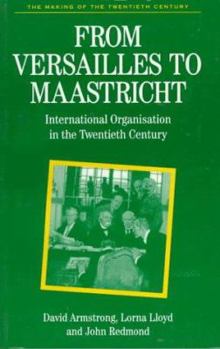From Versailles to Maastricht: International Organization in the Twentieth Century
From Versailles to Maastricht is a history of international organisation in the twentieth century. While particular attention is paid to the League of Nations, the United Nations and the European... This description may be from another edition of this product.
Format:Paperback
Language:English
ISBN:0312161174
ISBN13:9780312161170
Release Date:September 1996
Publisher:Springer
Length:336 Pages
Weight:1.10 lbs.
Dimensions:0.7" x 5.5" x 8.5"
Customer Reviews
2 ratings
EASY TO READ... A GOOD INTRODUCTION TO INTERNATIONAL ORGANISATIONS
Published by Thriftbooks.com User , 17 years ago
I am a student of political science, and in my case, I was studying for the subjects "International Institutions" and the "Politics of the European Union". For both subjects, this book has been a very useful source of information, to be complemented with other readings. This books presents an "easy to read" historical information about the developments of International Organisation since the years of the League of Nations. Its first chapters introduce the developments of the League and the United Nations (during and at the end of the Cold War), and the next chapters introduce the developments of the European Union until the Maastricht Treaty. Good points about this book is that it is easy to read, not boring al all. It presents developments in a simplified way, and moves forward covering important aspect on the subject. Bad points: it does not include recent developments... I would like to read, for example, about Kofi Annan's years in the UN, but the book was written while Boutros Boutros Gali was the UN's Secretary General. Despite that, I recommend this book, because it covers the main aspects of international organisation, its easy to read, and will be very useful to precede further readings. The 4 stars relate only for its absence of more recent developments.
Clever and authoritative
Published by Thriftbooks.com User , 26 years ago
Reviewed by Vladimir Matveyev in International Relations, Volume XIII, No 5, August 1997 - Towards the end of this book the authors remark that `... the essential core of international organisation is not the various administrative buildings in New York, Brussels, Geneva and elsewhere which represent the relevant institution in the public mind, but the rules, regulations and agreed procedures for which the institutions have assumed responsibility. In this sense the main thrust of the international organisation is the development of "international regimes": sets of rules which aim to regulate some specific activity of international interest'. This is, perhaps, the principal feature of the authors' approach to the problem of the unprecedented growth of international organizations throughout the twentieth century. In other words, they are more interested in analysing their place and role in the international system than in describing the administrative and legal aspects of international diplomacy. Yet, they do not completely ignore the latter. Their brief but accurate accounts of the activities of all the Secretary-Generals in the history of the United Nations are clever and authoritative. Above all, they foresaw that Boutros Boutros-Ghali would not be re-elected and they give their reasoning for this. Mentioning, in particular, that Boutros-Ghali was especially active and proficient in developing and implementing machinery for resolving conflicts (e.g. setting up `interim offices' in a number of former Soviet republics), the authors point out that he was also trying to extend his authority beyond the limits provided for by the UN Charter. Consequently, he came into conflict with the Security Council. While the number of international organizations has grown markedly, so too have the differences between them. They come in all shapes and forms: governmental and non-governmental, global and regional, military and economic, large and small, long-lived and brief. The authors' focus of attention, however, is on intergovernmental organizations and they concentrate on the most significant of those. The major part of the book deals with only two organizations - the United Nations (with the League of Nations also considered as the UN's predecessor) as a global organization and the European Community (later the European Union) as the most unique and advanced regional organization. Besides these, the authors briefly consider the history and functions of three of the most important regional organizations outside Europe - the Organization of American States, the Organization of African Unity and ASEAN. The last chapter considers several international regimes: those concerned with international economic order, the Law of the Sea, nuclear non-proliferation and human rights protection. In their selection of subjects, as well as in portraying the long and complicated history of both the United Nations and the European Union, the authors strike a proper balance bet






